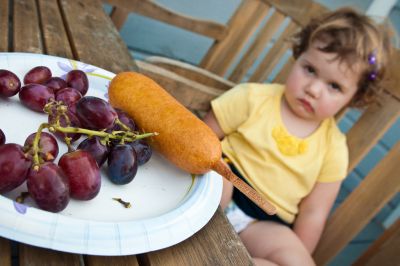As your baby becomes a toddler there are certain situations that, as a parent, you need to deal with. One of these situations is feeding problems. All of a sudden your child will become picky about what they eat. One of the most typical habits that begin to emerge is one day, your toddler is enjoying a particular food and then the next day for no reason, they reject the same food. Don’t worry… it’s not your cooking… it is all a part of growing up.
Your little one has little experience in making decisions and they need to learn to decide for themselves. It’s a part of their independency. When they do decide on their likes, your child will tend to change their mind often. Although it can be an annoying and frustrating habit, as a parent you need to be patient.
Feeding Difficulties
If your child has feeding difficulties, it is typical for any child. The world has become an exciting place and food may be less important when there are many other things to do. This is a normal part of behaviour that your toddler displays. A lot of parents have gone through the same situation as you may be facing and they have all gotten through it by implementing some basic strategies. The strategies that are listed in the table below will enable you to deal with feeding difficulties that your toddler presents during meal times.
Below are some techniques you can use to deal with common feeding problems with your child:
My toddler cries during mealtimes
- Take a more relaxed approach to mealtimes.
- Try and hide your tension as your child will be able to sense it.
- Chat calmly to your child while they eat.
- Set a good example by eating whatever is on your plate.
- Buy/Make a place mat with animals, cartoons etc. that you can use to distract your child so they eat.
My toddler only eats snacks, not meals
- Be creative.
- Present foods you want your toddler to eat in snack format.
- Simply cut up foods into small pieces and serve this on a small plate.
- Vary the presentation of the food from a formal meal into an informal snack.
My toddler always makes a fuss while eating
- Try not to force your child to eat what is placed in front of them.
- Let your toddler eat at their own pace.
- Have a calm and positive approach.
- Offer smaller amounts of food on the plate. The portion serving could be just too big.
- Buy your child their own eating set which they can use for eating their meals.
- Get your child to help with getting the food prepared and ready.
My toddler can’t sit still at the table
- You should try and sit with your toddler while they are eating.
- Encourage table manners and give praise for good eating habits.
- Check to see if the chair and the height of the table is comfortable enough for your toddler to eat food.
- Distract your child with conversation. Talk to your child about anything! The more engage they are the more likely they will sit still.
My toddler refuses to eat
- Cut the food up into small bite size pieces.
- Don’t overload your toddler plate.
- Try not to hurry your toddler up while eating or force them to have more.
- Make it a fun experience by playing games and talking with your toddler.
- Encourage them to have a set number of spoonfuls "lets have 4 spoons 1, 2, 3 and 4"
- Take away any distractions which is making them refuse to eat (TV off, games away etc).
- Suggest a fun activity they could do once they have finished eating their meal.
- Give a warning before meal times occur e.g. "in 5 minutes it's time to eat" etc. Use an egg timer if necessary.
- Only give milk or juice after meals not before. This could be the cause of your toddler filling too full to want to eat.
Feeding problems and refusing to eat are very common for toddlers. They are beginning to learn what it’s like to be in control and food is the easiest thing to control, eat or not eat. When your toddler is hungry they will eat and even if they don't eat much over a couple of days they tend to make up for it in the end. So try not to worry too much about it (although it can be extremely frustrating trying to feed a child who doesn't want to eat). Try offering the SAME foods half an hour later and see if that makes a difference. It’s also a good idea to have consistent meal times each night. Your toddler will begin to feel hungry around the fixed time. So create an extra spot on the table, for your toddler to enjoy family meal times with you.
Practical Feeding Strategies
Your toddler feeding problems will likely disappear in its own time. Depending on how long your child will have a feeding problem varies from toddler to toddler. Some toddlers continue their feeding problem for a couple of weeks and there are others who take a bit longer to adjust. Here are some practical ways to minimize your toddler’s eating problems:
Encourage new foods – Toddlers will enjoy a wide variety of foods and meals. Vary the presentation of foods including, texture, taste, colour and temperature. Wouldn't you get bored if you have to eat the same thing every day? So, be creative…
Assist Independence – Offer 2 choices that are appealing to your toddler. By offering choices, both of you will end up happy and feeding problems can be avoided. For example. beetroot or carrot, pasta or rice etc. Offer small portions as your child would more likely eat a small meal than a large one and they can always go back for seconds. Encourage your child to eat with a spoon, fork or their hands. As long as their eating, it doesn't matter how it goes in!
Regular mealtimes – It’s a great time to catch up with the family and enjoy a pleasant experience while eating. This is also to prevent your toddler from relying on snacks to curb hunger.
Not so much spice – Most young children don’t like spicy food. Your toddler may dislike a particular food just because it is heavily spiced.
Let your child decide – Although at times it may be difficult, you need to let your child decide how much they’ll eat. Your toddler has a natural ability to sense when they are feeling hungry and when they are full. However, if your toddler is engaged in an activity (such as playing with toys or watching a favourite show they will likely refuse to eat because they will want to continue their activity. Let your toddler know when meal times are approaching. For e.g. “In 5 more minutes, it will be time to eat”. Even though your toddler will not understand what 5 minutes is, they will realize that they have to get ready for meal time soon. Encourage your child to pack away their activity they are doing, wash their hands and sit down at the table to eat. Always make sure that your child sits at the table to eat rather than in front of the T.V (on occasions it is fine). This will encourage your toddler to eat their meals.
Serve disliked foods again – If you toddler doesn't like a particular food you can disguise it within the meal. For e.g. if your child doesn't like carrots, you can blend or shred them to add them to foods.
Be a role model – Your toddler should see you eating a wide variety of healthy foods. You should and limit sweets, soft drinks and junk food that you would normally consume yourself.
Using the strategies listed above, it will ensure your child’s feeding problems are minimized. Continue to explore different techniques and begin to appreciate the time you have with your growing toddler.
It is perfectly natural to worry about your child’s eating at some stage, especially when your toddler’s food intake and appetite change on a daily basis. Remember that this is all part of your toddler’s development. This is the time to encourage your child to join in family meals and try a wide variety of foods, tastes and textures.










